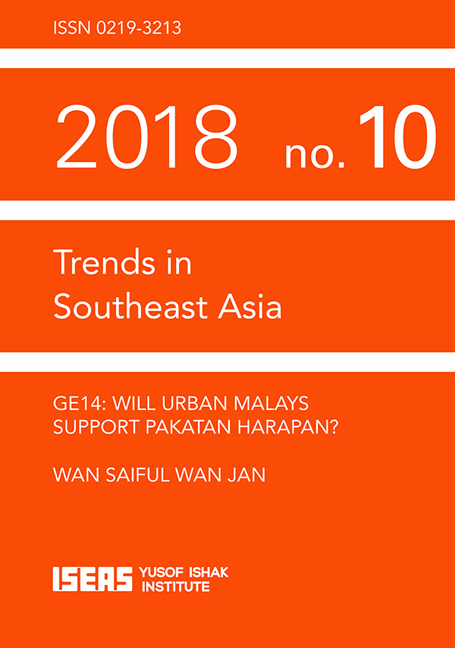GE14: Will Urban Malays Support Pakatan Harapan?
Published online by Cambridge University Press: 12 February 2019
Summary
INTRODUCTION
Many studies have found that voting trends in urban areas are different from that of rural ones. City-dwellers tend to be less loyal to a party compared to their rural counterparts. Hence, change from the incumbent tends to happen in urban areas first.
This essay focuses on urban voters in Malaysia, and their likely voting intentions in the upcoming 14th General Election (GE14) due to be held in mid-2018. It documents the findings from sixteen focus group discussions (FGDs) that were conducted in the northern state of Kedah and the southern state of Johor, in Peninsular Malaysia in January 2018. These two states were selected because they are both high on the list of states targeted by the opposition coalition Pakatan Harapan (Pakatan).
Following this introduction, the essay will describe the importance of the urban votes in the Malaysian political landscape, followed by the methodology of the study. Subsequently, the findings are presented and discussed. The essay concludes with comments on how the findings may impact the upcoming general election in the country.
BACKGROUND TO URBAN VOTES
Overall, Malaysia seems to follow the global trend wherein urban voters are usually more susceptible to voting for opposition parties. One of the studies that captured this trend was published in an ISEAS – Yusof Ishak Institute study of the 1986 general election. In that general election, rural voters continued to vote for the incumbent, in this case the Barisan Nasional (BN) coalition led by the United Malays National Organization (UMNO). The opposition won 29 out of the 177 parliamentary seats, with the Democratic Action Party (DAP) being the biggest opposition party with 24 seats. The study did not specify how many of the UMNO seats were urban or rural, but they categorized all the 24 seats won by the DAP as urban. The same study also implied that the 1986 general election was a continuation of the urban–rural divide that has been recorded in Malaysian politics since the 1960s.
Before going further, it is important to define the terms urban and rural as used in this essay. Following the definition provided by Politweet, a social media socio-political research firm, urban constituencies are defined as densely populated places, usually having within their boundaries a city or larger towns. On the other hand, rural constituencies tend to be physically large but with a smaller population found scattered in small villages.
- Type
- Chapter
- Information
- GE14 , pp. 1 - 31Publisher: ISEAS–Yusof Ishak InstitutePrint publication year: 2018



